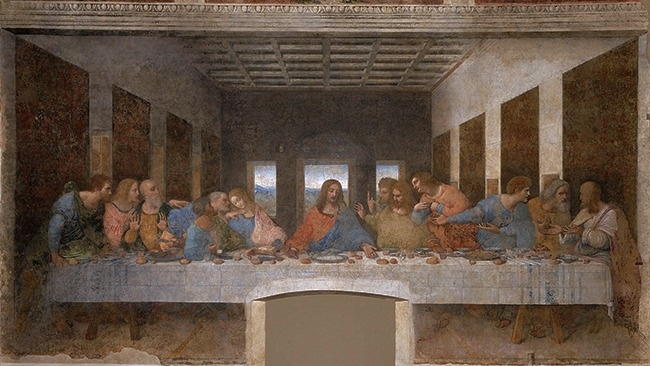What other mysteries has this legendary master hidden in his works?
5. A mistake in the painting Salvator Mundi

If you take a close look at the painting, you will notice that the sphere in Jesus’s hand is transparent. But Leonardo, who studied the laws of optics carefully, should’ve known that the background behind the crystal sphere cannot appear this way. The background should be enlarged and should appear out of focus.
4. A surprising fact about The Last Supper

What could unite Jesus and Judas on this canvas? There is a legend according to which the same person was a model for both Jesus and Judas. Unfortunately, it’s unknown who this person was.
According to the legend, da Vinci found his Jesus in the church choir where the latter served as a chorister. Later, when the painting was almost finished, the master could not find anyone for the role of Judas and that’s when he came upon a drunk man lying in a ditch. When da Vinci finished painting the image of Judas, the model confessed that he recognized the painting because he posed for it as Jesus 3 years ago.
3. Another surprising fact about The Last Supper

Another interesting detail in this painting is the overturned salt shaker lying next to Judas. It’s possible that this can support the belief that spilled salt leads to trouble, since the canvas depicts the moment when Jesus says that one of the gathered will betray him.
2. A recent revelation regarding The Portrait of Isabella d’Este

The Portrait of Isabella d’Este has been recently found and according to scientists, it belongs to the works of Leonardo da Vinci. This is indicated by a pigment and a primer identical to those used by the artist, as well as the very image of the woman who is incredibly similar to Mona Lisa — particularly her smile.
1. The various versions of Lady with an Ermine

Lady with an Ermine passed through a new scanning technique and surprised scientists with the fact that it was not always an ermine that the painting depicted. At least 2 versions of the portrait were painted on the same canvas before it took on the form we know now. The first version was without the ermine and the second depicted a different animal entirely.












